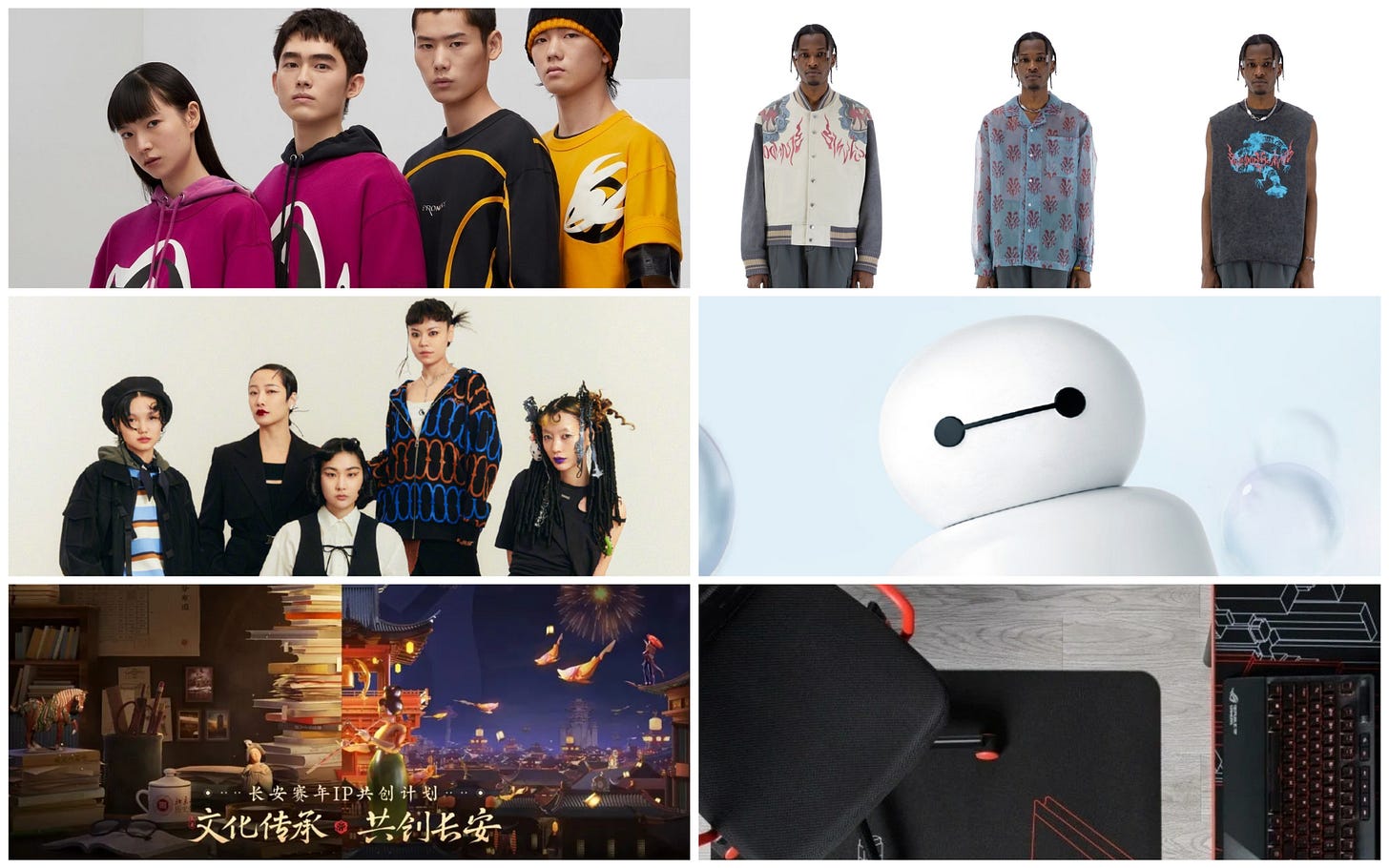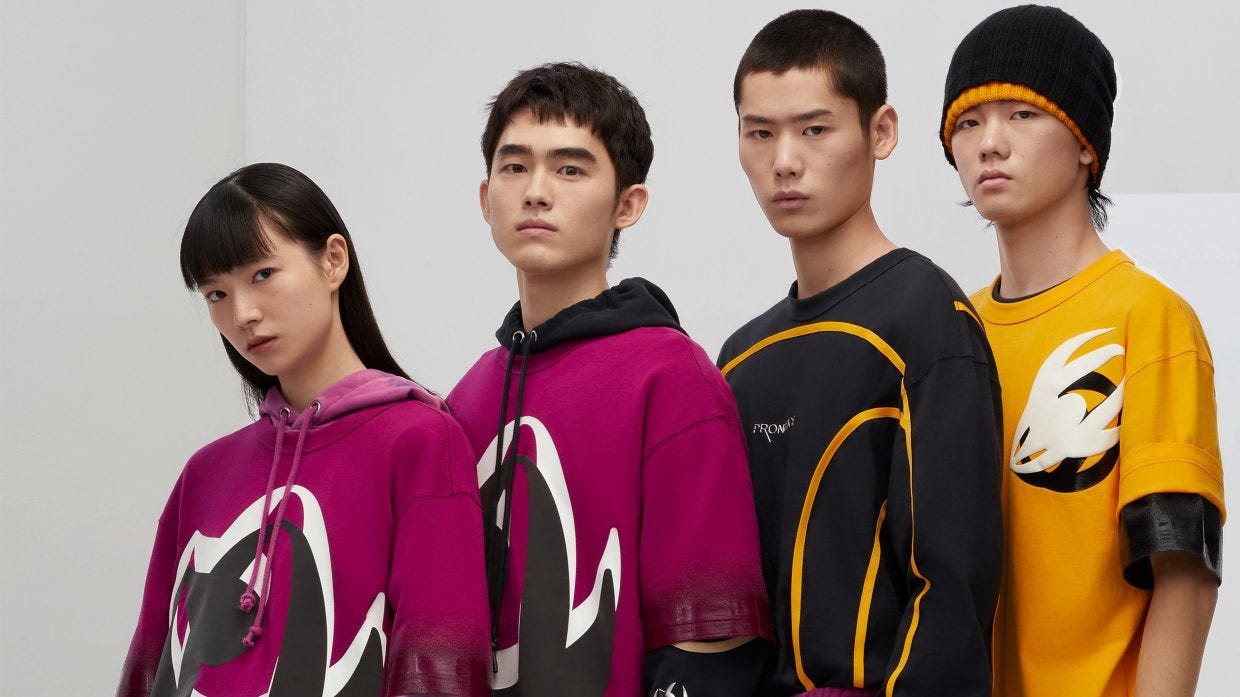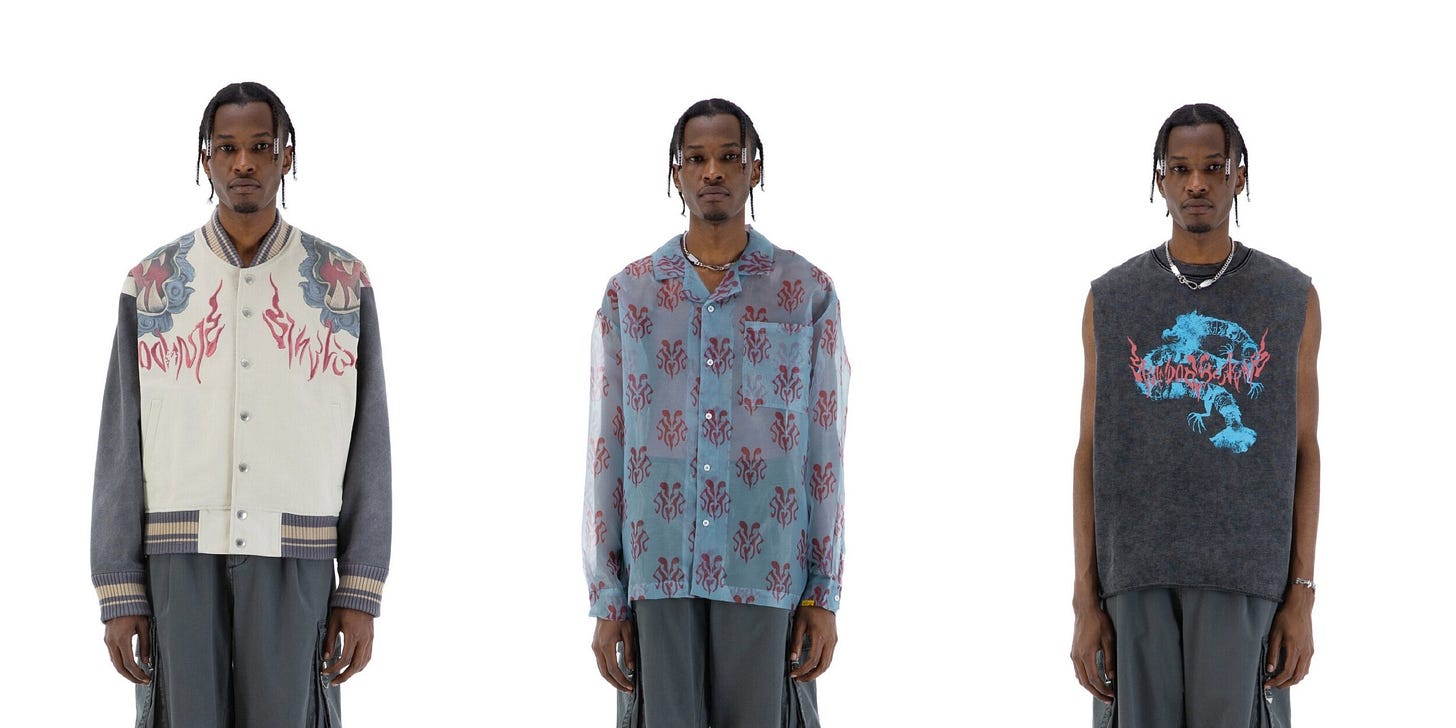February 2021 Best of Brand Collaborations
Plus: BMW’s marriage story, a Lunar New Year holiday wrap-up, and Bilibili's big 2020.
Published three times per week, the Content Commerce Insider newsletter highlights how brands create content to drive revenue, globally. If you have received our newsletter from a friend or colleague, we hope you will subscribe as well and follow us on LinkedIn and Instagram.
Every month, CCI looks back at some of the most memorable initiatives in China’s active brand collaboration scene, where creativity and ability to connect with Gen Z and millennial consumers on the latest trends are keys to success.
Top Pick: H&M x Pronounce
Taking Chinese-style collaboration global, fast-fashion retailer H&M announced an upcoming drop created with the independent Chinese label Pronounce. The collection, designed by Yushan Li and Jun Zhou, takes its inspiration from China’s famed Crescent Lake in Dunhuang (an oasis on the ancient Silk Road) and traditional folk tales, with graphic patterns and embroidery in shades of burgundy and gold.
“We developed this collection during the pandemic. The idea of a lake in an oasis to us symbolizes a sense of hope in a difficult time,” Li told WWD. “We imagined a hike in front of the Crescent Lake, and we explored the subtle layers of everyday wear and combined them with unique craftsmanship to provide more possibility for the wearers.”
Pronounce has become a savvy pick for numerous other brands (such as Diesel, Gap, and Mini Cooper) seeking to reach China’s young, culturally-inclined consumers and fans of guochao (“national trend”) style, as the designers fuse traditional aesthetics with the sensibilities of contemporary streetwear. Pronounce’s latest menswear collection, for example, explores Chinese pottery from both physical and philosophical perspectives.
The collection will be sold through H&M’s premium streetwear label, Blank Staples, which is only available at select stores around the world, though in China it will be available via multiple channels, including H&M’s website and app, official Tmall flagship store, and WeChat store.
Five more noteworthy collaborations from February 2021:
Randomevent x “A Writer’s Odyssey”
In the hyper-competitive Spring Festival marketing season, it’s become imperative for brands to look beyond standard forms of collaboration model and place a greater emphasis on creativity through partnerships. This is especially true in the fashion sector, where brands vie to outdo each other with holiday-themed limited-edition collections for either gifting or self-treating.
Rather than just put out designs that relied on the Chinese zodiac (the Ox this year), the Shanghai-based streetwear label Randomevent paired up with one of the hottest IPs of this year’s holiday, the suspenseful fantasy epic “A Writer’s Odyssey” (刺杀小说家). The men’s capsule collection includes embroidered jackets, t-shirts, hats, and other apparel that merges contemporary street culture with more traditionally-inspired imagery from the film— a combination meant to appeal to the growing number of fans of guochao (国潮, “national trend”) style.
Peacebird x Six Chinese Fashion Brands
In the current era of “mega collaborations,” straightforward one-on-one brand partnerships may no longer be enough to stand out from the crowd. Chinese fashion label Peacebird teamed up with six domestic indie brands to expand on its “SuperChina” initiative, with designers from each taking the signature elements from their respective brands to create a capsule collection aimed at Gen Z consumers.
The SuperChina campaign also invited creative professionals from a variety of backgrounds to interpret the theme of the series via their unique personal styles, and Peacebird brand ambassador and uber-influencer Ouyang Nana also promoted the collection via Weibo videos.
Perfect Diary x Disney
C-beauty brand Perfect Diary frequently uses brand collaborations as part of its broader strategy to win over China’s millennial and Gen Z consumers. A recent partnership with Disney introduced a limited-edition series of its amino acid-based facial cleansing products reimagined with inspiration from the Baymax character from the 2014 animation “Big Hero 6.”
Appealing to the love of cuteness and blind-box style toys among young consumers, two of the makeup remover bottles are capped with a Baymax head, while other products feature illustrations of the character on the packaging. The simple features of the superhero robot figure, rendered in black and white, mesh nicely with the minimalist aesthetic of Perfect Diary’s collection.
Honor of Kings x Peking University History Department
Higher education represents a new and largely untapped new front in China’s booming brand collaboration scene. After partnering with a range of top-tier consumer brands — from MAC Cosmetics to Burberry — Tencent’s Honor of Kings launched a strategic cooperation with the history department of Peking University (often called the “Harvard of China”).
The partnership involves working with two professors to jointly produce content for the game’s “Chang’An Competition Year,” named after the capital city for much of the Tang Dynasty (618-907), which is widely regarded in China as the peak of ancient civilization. Tencent also released an immersive mobile VR tour of the game’s Chang’an scenery and launched a public co-creation competition focused on art, design, video, and dance.
Ikea x ROG
Taking a “China-first” approach to product innovation, Ikea debuted a hotly anticipated collaboration with Asus Republic of Gamers (ROG) on a new range of affordable gaming furniture and accessories. The jointly designed Uppspel family of products was launched in China in February, but will not reach the rest of the world until later this year, highlighting the importance of the Chinese market and its estimated 720 million gamers.
The black-and-red collection includes a sleek high-backed gaming chair priced at RMB 999 ($155), an adjustable table that can be used as a standing desk (with a more premium price point of RMB 3,999, or around $620), and a wall-mounted pegboard to keep gaming equipment organized. Ikea is also introducing a series of self-designed items that will be useful for gamers, like a headphone stand, cupholder, and floor mat.
Mentioned in today’s newsletter: Alibaba, Asus, BMW, Bilibili, Burberry, Diesel, Disney, Gap, H&M, Ikea, MAC Cosmetics, Mini Cooper, Peacebird, Perfect Diary, Pronounce, Sony, Tencent.
Brand Film Pick: BMW’s Marriage Story
Last year, BMW produced one of the most-watched brand films for the Lunar New Year. “Bayier’s Spring Festival” (巴依尔的春节), directed by Ning Hao, a touching and nostalgia-filled play on the automaker’s change of its Chinese name in the 1990s.
But with more and more brands releasing Spring Festival films, it’s becoming harder to stand out amid a crowded field of content. Taking a different approach this year, BMW opted to focus its major film production efforts on an adjacent holiday, Valentine’s Day, which coincided with the third day of the Year of the Ox — still timed well to draw attention from audiences with more free time during the week-long break, but with enough space for a narrative that departs from the usual Spring Festival tropes of family gatherings to explore concepts of love from other angles.
“The Wedding” (婚礼) tells a millennial love story as imagined by Xin Shuang, whose directorial debut, the edgy suspense series “The Bad Kids” (隐秘的角落), was arguably the biggest hit drama of 2020. In the film, BMW represents more than just a luxurious mode of transportation (ideal for major events such as weddings). One mid-1990s 3 series model also serves as witness to the evolution of a couple’s relationship from childhood to the present day, creating a deeper impression of the role that BMWs can play in their owner’s lives.
News From China
China’s Lunar New Year holiday officially wrapped up with the Lantern Festival on February 26 (the fifteenth day of the first lunar month), and with more Chinese staying home once more this year due to the coronavirus, many of the traditional celebrations were conducted online.
While state broadcaster CCTV commands the most attention for its Spring Festival Gala held on the eve of the Lunar New Year, major satellite networks and regional broadcasters all offer their own splashy takes on the variety entertainment format. This year the most-buzzed-about performance came from the lesser-known Henan TV, which used augmented reality to create a compelling dance show centered around works of art from the Tang Dynasty, which is considered the cultural apogee of imperial China.
Quickly capitalizing on the viral popularity of that performance, Henan TV brought out the dancing Tang Dynasty palace maids once more for a special on February 25, “The Henan Museum Lantern Festival Wonderful Night” (河南博物院元宵奇妙夜), which offers a potential new model for holiday entertainment. Eschewing the scattershot and hours-long approach taken by most gala producers, Henan TV’s 30-minute show took a more single-minded approach, taking audiences on a tour of the province’s cultural treasures both inside the museum and out.
Some viewers lamented that the airtime was too short, but that was the result of the producers having but days to plan and execute the program. With China’s major e-commerce platforms making a major push into gala-style entertainment to boost sales during their major shopping festivals, Henan TV’s cultural model could provide a path to differentiation — and one that would appeal to higher-end brands.
Last week video streamer Bilibili released results for the fourth quarter and full year of 2020, beating expectations with year-on-year revenue growth of 91%, though its losses more than doubled during the same period.
Bilibili had a banner year in 2020, marking a definitive turn from a niche ACG (Anime, Comic and Games) platform to a mainstream content powerhouse, backed by the likes of Tencent, Alibaba, and Sony. Over the course of the year, Bilibili saw its average monthly active users (MAUs) grow by 55% to 202 million, and it has ambitious targets for the coming years. On a conference call, CEO Rui Chen announced a new three-year target of 400 million MAUs.
Giving out virtual red envelopes (aka hongbao) has become a tried-and-tested strategy for new user acquisition among the major tech platforms that battle it out every year around the Spring Festival to spend record sums.
Now similar strategies are being rolled out to boost e-commerce livestreaming sales. Top Taobao livestreamer Viya recently launched a “hongbao rain” campaign during a pre-sale for International Women’s Day on March 8 (aka Queen’s Day), which has become heavily commercialized in China.
Users could “grab” virtual envelopes with varying amounts of cash by downloading Taobao’s upgraded Diantao livestreaming app and following Viya as “favorite fans,” winning both users for the platform and followers for the popular anchor in the process.
News in English
Domestic coronavirus-related travel warnings pushed more of China’s Spring Festival holiday traditions online this year, from gatherings to entertainment to consumption. SCMP
From staycation to “revengecation”: While domestic travel during the Lunar New Year period was way down this year, there’s likely to be a rebound in the spring from pent-up demand, especially around the May 1 Labor Day holiday. Moodie Davitt Report
Italian luxury label Bottega Veneta removed all content from its Weibo account last week, following a pullback from Western social media earlier this year, as it shifts its marketing strategy to focus more on brand ambassadors and fans. Bloomberg
Canadian coffee chain Tim Horton’s closed a new round of financing for its China expansion led by Sequoia and backed by Tencent, and plans to add 200 new outlets in the country this year. KrAsia
China’s trendy bubble tea chains are expanding into creative coffee offerings as well. Dao insights
An inside look at how Perfect Diary uses WeChat groups and virtual representatives to push group buying of its beauty products along with assorted goods from other brands. Warc
The little emperor economy: The Chinese market for children’s goods and services is worth nearly $700 billion, with parents spending as much as half of their income to support the next generation. Inkstone News
The mother-daughter time-travel comedy “Hi Mom” became the third-highest-grossing film ever in China amid a record-breaking month for the domestic box office. Xinhua
Trump’s loose ends on Chinese tech: A review of where things stand in the United States for major players such as TikTok, WeChat, and Huawei. Axios
Chinese spittoons are getting a rebrand on Amazon, where they are being offered as “traditional fruit baskets” selling for around 15 times the usual price back home. Global Times
We’ve Got China Covered
China Film Insider: The Rise of a Chinese Rural Poet on Video Platform Kuaishou
Jing Daily: C-beauty Disruptor Florasis Taps Rising Boy Band TNT as New Ambassador
Jing Culture & Commerce: How Arts Organizations Can Use Minecraft to Tell Stories










